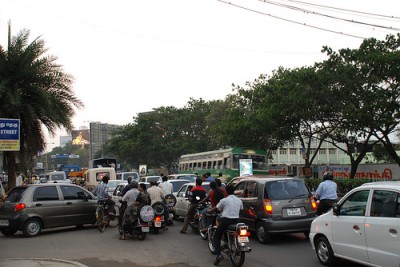by Divya Ananth
6 am – Sunlight streams in through the canopy of green on Alagirisamy Salai. Water splashed on entrances of homes adds swish – sweep, swish – sweep rhythm to the street. Filter coffee. Suprabatham. Kolams outside the gates. The street is at its beautiful best. The bustle is yet to begin. The hustle is waiting to be unleashed.
7.30 am – A couple of school vans arrive. Older children troop out, some with tennis racquets, some with charts in their hands for a school project, some holding a little sister or brother by the hand. The gates of the school open. The watchman is at his kindest best. “Good Morning”, he chirps as a fifth grader gets ready for cricket practice.
8.30 am – Kids of all shapes and sizes – small, big, thin, stout, girls, boys, long-haired, pony-tailed, bespectacled, curly-haired, gregarious, sullen, gap – toothed, sleepy, grumpy, happy, cycling, laughing, sulking, worrying – kids, kids and more kids turn the corner, entering the Salai.
Some get off a van, some alight from a two wheeler, some hurry to jump out of a car, braving the honks from behind.
9 am – The hustle and bustle is here and now. Wailing two footers, anxious parents peeking from a crevice in the wall on the street, watching fondly as the little one trudges along, angry drivers, squabbling for a square inch of space to park, harrowed office goer who cannot seem to reverse his car out of his own home on the other side of the street, school volunteers, trying to calm frayed nerves; students managing traffic, reasoning with an auto rickshaw that entered through the “one way” street. Amidst all the chaos, the watchman gently cajoles a wailing kindergartner into a whole new world.
9.30 am – All is calm, all is quiet. The entire street is recovering from the palpitation. The stationery shop rolls open the shutters. The fruit vendor wheels his vehicle strategically outside the school gate. The vegetable vendor diligently sprinkles water on his fresh greens. Tailors enter the 10-by-10 room adorned with mounds of cloth, and take to the pedal. Yoga centres, day care centres, ice cream parlours, beauty salons, lending libraries, coffee shops – all tiny square feet of businesses open up one by one.
As the children travel through the annals of history, experiment with hydrochloric acid, or listen to the drone of a botany class, the street outside practices commerce and economics. Hurried homemakers haggle with the vegetable vendor, while exchanging notes on recipes, summer camps and the maid who hasn’t shown up.
12 noon – The kindergartners walk out in a line. The massive wide green trees that have seen generations and generations of children get ready to be of special service. Under their shade, the balloon vendor cries hoarse, punctuated by the music he produces by rubbing his finger on the balloons. Gleeful children try climbing the branches; some swing, some are too afraid.
As class by class is dispersed, the street gains more colour. Older children sit down at the coffee shop. A TV screen outside the shop playing a cricket match attracts a bunch of teenagers. High fives and excited shrieks puncture the air. There is joy, there is colour, there is youth bubbling and gurgling over the length and breadth of the street. Friends walk, shoulder to shoulder, lost in discussion, about a lost match, a beautiful girl, an impending exam.
4 pm – Teachers ride out. The street sees saree-clad, jasmine-adorned ladies taking to their two wheelers, turning on the ignition of the cars, or walking wearily to the nearest bus stop.
Between the school where minds are moulded, lesson plans detailed, questions answered, and the home where family and a fresh set of chores await, the street gives them a much-longed-for respite. They gaze momentarily at the familiarity of the beloved Salai.
The fruit vendor is counting the fruits of his labour. The watchman chats with the van driver over a cup of tea, under the tree.
Remains of tender coconuts that people lapped up earlier in the day lie in a heap on the street, waiting for the next day’s trash clearance.
Another day comes to an end on the street.
Many years later, tucked away on the other side of the globe, Ajai stares blankly at the snowed in street. The snow falls oh-so-softly. There is an all-consuming silence. The tick tock of the clock seems so loud. Was it always this loud? He wonders.
Back in Alagirisamy Salai, the laughter of the growing up years, the samosas with friends at Anand Bakery, the tree climbing activity every single day, the balloon vendor who was mom’s arch rival, were all so happily noisy, that the ticking of the clock was barely heard. Perhaps, it was all over all too soon.
He had walked the roads of Berlin, strolled through the Champs Elysses, hurried to work every day in Canary Wharf and window shopped till he dropped on Orchard Street.
Yet, if there was a place on earth that was invaluable and deeply treasured, it was the heap of memories that one special street gave him for fourteen whole years – Alagirisamy Salai.
Divya Ananth is an advertising copywriter – a creative consultant. She simply loves to travel, and Carnatic music is her anchor in an otherwise crazy life. She’s also a busy mom of two adorable boys, and juggles cricket and tennis classes, organizes play dates and reads Geronimo Stilton with them. Writing, to her, is an intimately joyful experience.
Pic : http://www.flickr.com/photos/bronsthermonster/






Your ability to capture reader’s attention all along, is amazing.